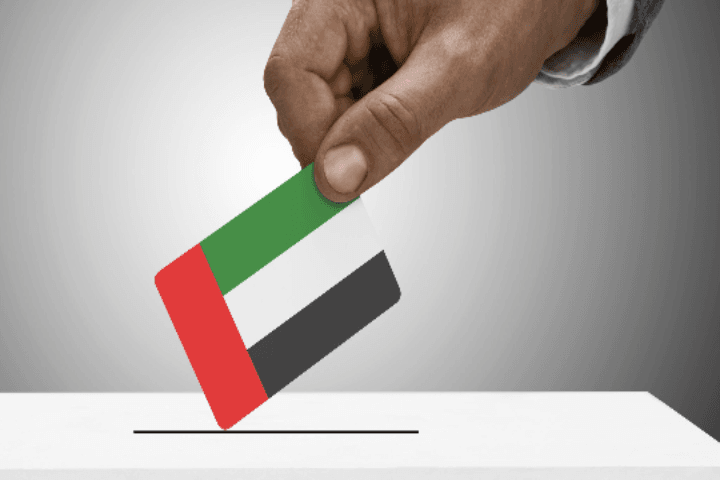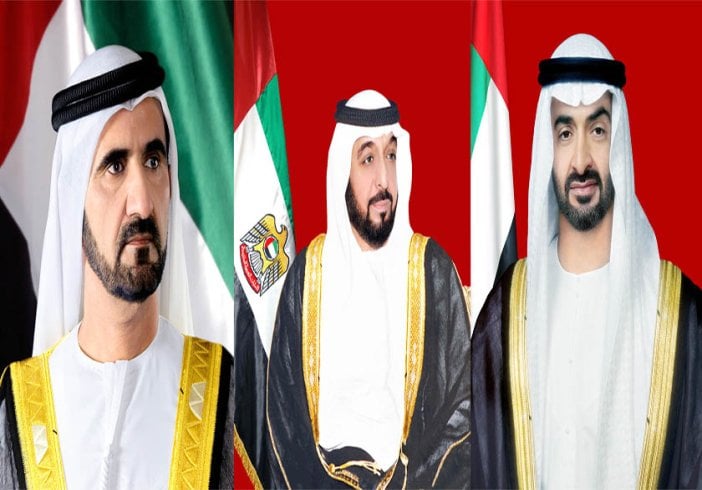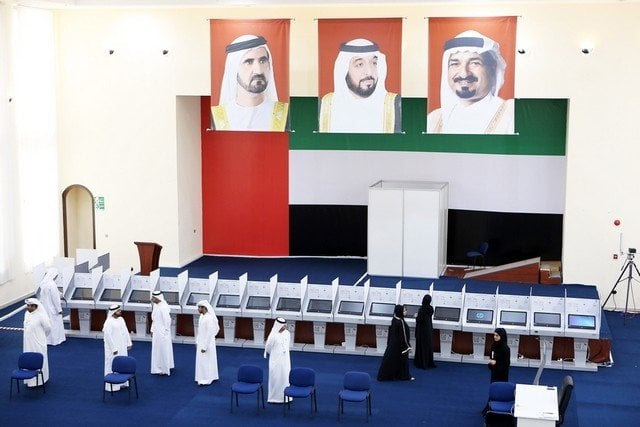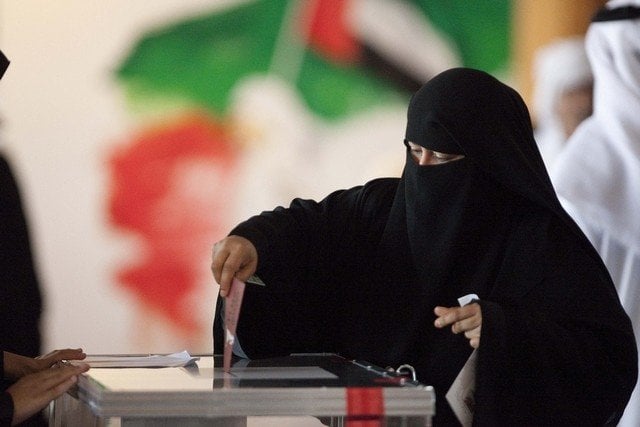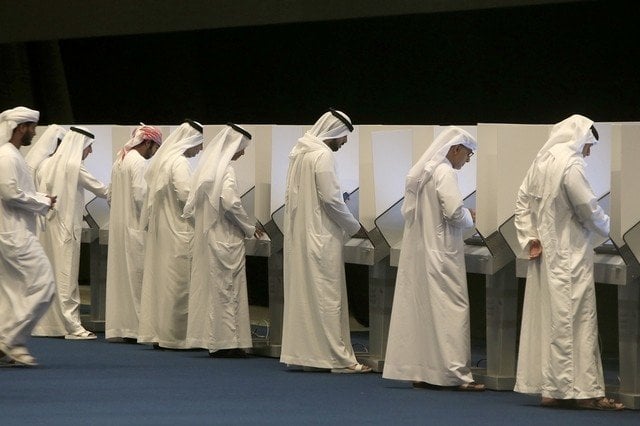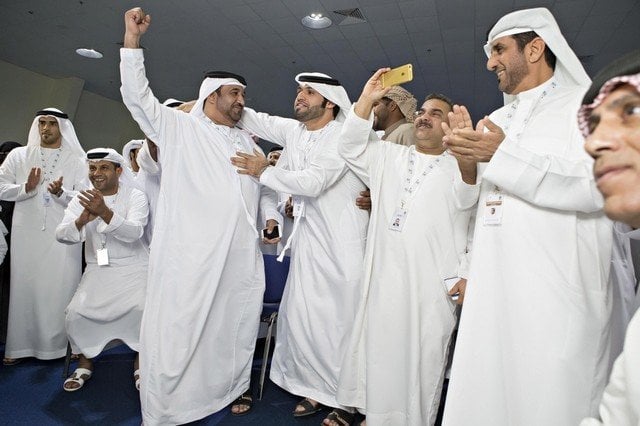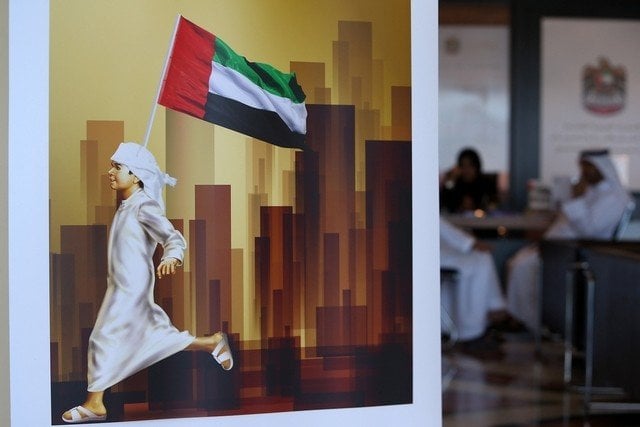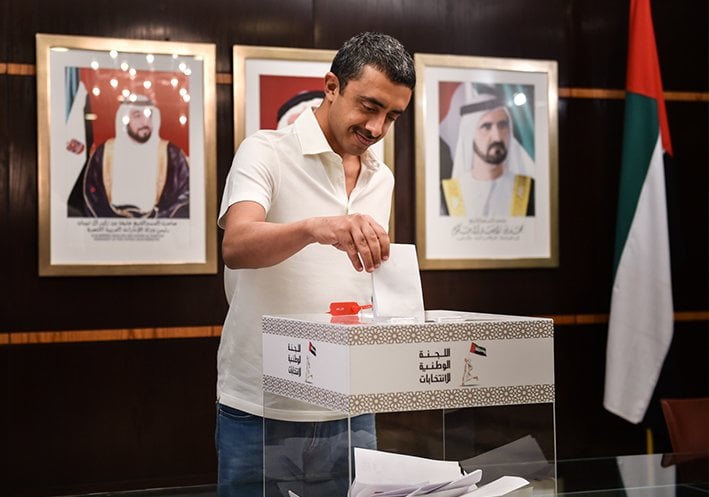Mehmood Ul Hassan Khan
United Arab Emirates (UAE) is slowly but surely on the path of further democratization. Most recently, UAE held its 3rd Federal National Council (FNC) Elections in the country. Process of politicization has now been further strengthened. FNC is playing tremendous role in the political stability and sustainability of the UAE. It provides true spirits of democracy. It guarantees media and press freedom. It safeguards the rights of women and minorities rights.
Universal Suffrage
It is its giant strides towards universal suffrage. The UAE has rightly adopted a gradual political approach to develop parliamentary experience, matching the unique cultural experience of the UAE community in all areas. It has also showed deep rooted democracy in the society, traditions, culture, laws and people of the country.
His Highness Shaikh Mohammed bin Rashid Al Maktoum, Vice-President and Prime Minister of the UAE and Ruler of Dubai
His Highness Shaikh Mohammed bin Rashid Al Maktoum, Vice-President and Prime Minister of the UAE and Ruler of Dubai said democracy in the UAE is firm and deeply embedded in the conscience of the local society.
He said democracy has been part of the UAE’s heritage “since the time of our fathers and forefathers and we inherited that value with pride and belief in our social, cultural and religious legacy without compromising the rich Arab-Islamic culture”.
The FNC has been a great forum for public-to-government interaction. The UAE’s decision to bring the general people in government decision-making has helped the nation take great strides in policy-making. Therefore with the expanding the pool of eligible voters, we will make further strides in democracy,”
The names of the preliminary winners in the Federal National Council Elections 2015 have been announced. FNC Election was conducted in three stages throughout the country.
Salient Features
The combination of the above given diagram clearly shows that it further enhanced political participation and successfully achieved universal suffrage in the country.
Dr. Anwar Mohammed Gargash, Minister of State for Foreign Affairs, Minister of State for Federal National Council Affairs (FNC) and Chairman of the National Election Committee (NEC)
According to Dr. Anwar Mohammed Gargash, Minister of State for Foreign Affairs, Minister of State for Federal National Council Affairs (FNC) and Chairman of the National Election Committee (NEC), voting was also held at UAE embassies and diplomatic missions abroad. Early voting in the country enabled eligible UAE citizens to elect half of the 40 member Federal National Council (FNC).
Milestone
During the press conference, Dr. Anwar Gargash said the nation has achieved another milestone that has instilled in Emiratis the spirit of patriotism and loyalty to the leadership. He added that the UAE’s third electoral experience has become a key contributor to the nation’s development march.
Dr. Gargash expressed his appreciation to UAE President His Highness Sheikh Khalifa bin Zayed Al Nahyan for setting the pillars of the national empowerment programme, which concluded its third stage today through the FNC Elections 2015.
He also thanked Vice President and Prime Minister of the UAE and Ruler of Dubai, His Highness Sheikh Mohammed bin Rashid Al Maktoum, along with all the Members of Supreme, Their Highnesses Rulers of the Emirates for their immense support to this pioneering national initiative through their continuous supervision of the electoral process.
Dr. Gargash also extended his gratitude to His Highness Sheikh Mohammed bin Zayed Al Nahyan, Crown Prince of Abu Dhabi and Deputy Supreme Commander of the UAE Armed Forces, for his support to the electoral programme.
Statistical Presentation
Electoral Significance Details
Electoral College 224,279 voters
Turnout 35.29 per cent
Voters 79,157
Men 52 percent
women 48 percent
Source: The National Election Committee (NEC)
FNC Elections 2015 was equipped with all the facilities enabling the voters to exercise their electoral right smoothly. The parliamentary process started as early as 2006, when the first electoral pool of about 7,000 Emiratis was selected to vote. In the second round of FNC elections, about 130,000 Emiratis were granted voting rights, an increase of about 18-fold from 2011.
Name of the Emirates Breakdown of Eligible Voters (2015)
Abu Dhabi 90,408
Dubai 53,568
Sharjah 31,766
Ras Al Khaimah 27,455
Fujairah 10,887
Ajman 6,090
Umm Al Quwain 4,105
Source: The National Election Committee (NEC)
Furthermore, a total of 330 candidates, including 74 women, from across the seven emirates contested the elections 2015. A unique feature of the elections this year was the introduction of early voting for three days during which 37,663 voters cast their votes. Voting was also held from outside the UAE in 94 polling centres in the UAE embassies and diplomatic missions in most countries around the world, participated by 1,378 voters.
Fujairah led the way with younger voters, with 85 per cent of those eligible under the age of 40. Sharjah, Ajman and RAK follow with 70 per cent, while in UAQ, 69 per cent of voters were in that demographic. Abu Dhabi and Dubai had 67 and 59 per cent of their voters under 40.
Moreover, the percentage of female voters increased from 46 per cent in 2011, but more than doubled from 2006 to 2011. Women outnumbered men in Abu Dhabi and Dubai, at 53 and 51 per cent respectively.
The electoral process has led to the election of 20 candidates, representing half the members of the Federal National Council. The total number of voters included 48,330 men and 30,827 women.
Name of the Emirates Cast Votes Percentage %
Abu Dhabi 35,046 38.7
Dubai 11,760 22.1
Sharjah 9,585 29.7
Ras Al Khaimah 11,444 41.9
Fujairah 5,475 49.79
Ajman 2,965 49.79
Umm Al Quwain 2,882 70.1
Source: The National Election Committee (NEC), 2015
The final official results will be declared on October 11, 2015, only after the completion of the period of appeals on the results which starts on Sunday (October 4), according to the timetable for the Federal National Council Elections 2015.
FNC Elections has ensured the selection of active members who are able to research societal issues thoroughly and transparently, and find effective and appropriate solutions. Each election brings a greater number of voters, confirming the keenness of the Rulers to enable citizens to play an active part in political development. This is in line with the empowerment programme launched by the President, Sheikh Khalifa.
Voters elected Federal National Council members based on their qualifications and not tribal connections. It is the true reflection of positive patriotism. Active community representation is must for further democratization. It enhances good governance. It fosters transparency. It promotes accountability. It promotes Emirati identity and trains nationals to deal with emergencies.
It abridges gap between the Rulers and People. Rulers need to know what people at every level of the community think and want and feel. It is important for those in high office to be aware of what ordinary citizens are discussing in the majlis.
Guidelines
As part of efforts to ensure the highest standards of efficiency, accuracy and transparency in the Federal National Council Elections 2015, the National Election Committee (NEC) announced a timetable for the election process during its 11th meeting held in Abu Dhabi.
1. Nominations to the Elections 2015
The NEC announced opening of nominations to the elections on August 13, followed by registration of the candidates, which lasted for five days starting August 16. The preliminary list of candidates was announced on August 23. Three days August 24 to 26 were set aside for submission of objections on candidate nominations. NEC responded to the objections on August 27.
2. Final List of Candidates
The final list of candidates was announced on August 31, following which the election campaign was carried out for 25 days from September 6 to 30. The last date for withdrawal of candidates was September 14, which was also the deadline for candidates to submit the names of their agents.
No Discrimination
There was no discrimination against any candidate in the elections 2011. The FNC elections 2011 offered a chance for all nationals of different age and gender to engage with the diverse processes of democracy and play important role in the decision making process. The voters were free to cast their votes.
The FNC elections 2015 offered a chance for all nationals of different ages and genders to engage with the diverse processes of democracy and play important role in the decision making process.
Healthy Traditions
United Arab Emirates once again created sound and healthy traditions by holding FNC elections in the country. Middle East where people are struggling for achieving democracy, the UAE plans for further democratization is a bold and right step.
UAE’s Model of Democracy
UAE has its own model for democracy which ideally suits its macro-economic development which has already produced massive turnaround in its socio-economic prosperity, political articulation and above all rule of the law and the elections 2015 further strengthened this process.
Policy of Openness and Tolerance
Right from the beginning, the UAE adopted steady policy of openness and tolerance which has translated into unshakable political stability and coalescing social harmony in which the Federal National Council’s contribution is paramount.
Candidates Stature
Majority of the candidates were between 35-45 years category that strived to brighten the future of the younger generation of the country for a better UAE society.” It is said in modern political science discipline that an engaged populace is an empowered populace, so FNC elections 2015 would further engage members of society for achieving the collective desired goals.
The 40-member FNC currently has the authority to debate and amend laws, question ministers and discuss the annual federal budget. Half of the FNC’s members are appointed by the rulers of the seven emirates, while the other half are chosen by an electoral college
Utility of FNC
The 40-member FNC currently has the authority to debate and amend laws, question ministers and discuss the annual federal budget. Half of the FNC’s members are appointed by the rulers of the seven emirates, while the other half are chosen by an electoral college.
It also shows functional cooperation that exists between the legislative and executive branches of the government.
For the efficient governance of United Arab Emirate after its establishment in 1971, the seven Emirates established a new federal institution i.e. FNC.
FNC’s Areas of Scope Details
National Issues Security, foreign affairs, nationality, defense and immigration
Public Issues Health, education, postal, currency, phone and other communication services
Regulatory Issues Licensing of aircraft and air traffic control in addition to this different other sectors specifically described, including banking, labor relation
Judicial Issues Extradition of criminals and delimitation of territorial waters
Source: UAE’s Constitution
It shows UAE’s unique blend of traditional and modern political system that have ensured national stability and had been a stepping stone in the development of the country.
According to the current scenario, the federal system includes the Council of Ministers (Cabinet), Supreme Council, Federal Supreme Court and a parliamentary body in the form of the Federal National Council (FNC). The supreme Council elects the Vice president and President amongst them for a renewable tenure of five years.
FNC’s Performance
During the last so many years FNC had discussed on hundreds of issues and drafted laws regarding people and economy of the nation. According to the Constitution, the federal draft laws should first pass through FNC for it reviews and recommendations. The Draft and Amendments’ composed with the support of specialized house committees are presented in the Council for discussion and then sent back to the Cabinet for its consideration and approval.
FNC act as a forum where its members are able to question the ministers for certain decisions. Cabinet members are generally interrogated by members during debates for certain issues. Maximum number of recommendation and amendments done by Federal National Council are adopted by UAE Government.
FNC’s Functions
The relationship between the FNC and the government is based on the common good of the UAE. It reflects the highest priority of the wise leadership of the country to give voice to the citizens.
Legislative and Supervisory Role
The Federal National Council has both legislative and Supervisory role and the member of FNC is also the member of the Arab Parliamentary Union (APU) as well as International Parliamentary Union (IPU). FNC’s 1st session was inaugurated by Late President Shaikh Zayed Bin Sultan Al Nahyan on February 13, 1972.
The FNC is a crucial, irrespective of not being executive, part of the Lawmaking technique in UAE. Draft laws are formulated by Council of Ministers (i.e. The Cabinet), and then forwarded to FNC for debate and reviews, which receives an approval from the Supreme Court before acknowledging and declaring those laws. The NFC also argument, analyze and authenticate the annual budget of the country. FNC is also assisted and supported by various Studies and Research Units and sub-committees which are specialized for the functioning of FNC.
The amendment consists of number of Articles that deals with Federal national council, facilitating for the expansion of its power and gradually proceed for development and strengthening its function in the constitution.
Federal national Council power can be considered consultative efficiently rather than legislative. Presided by the speaker or any of the two speakers, elected among themselves, Under the constitution FNC is responsible for amending and examining all recommended federal legislation, and is given the power by Constitution denounce and question to any federal minister regarding the performance of the ministry.
FNC’s Different Integrated Powers Details
Legislative FNC is the legislative branch of the constitution
Federal Legislation It is responsible for analyzing, investigating and amending the proposed federal legislation
Consultative Duties It is responsible for carrying out country’s major consultative duties
Supervisory Role The constitution has provided the FNC with both supervisory and legislative roles
Modification The Constitution has empowered and given the FNC to analyze and modify any projected federal legislation
The major role of the FNC is consultative, as it has only the authority to give recommendations on the federal legislation and for the Supreme council to take action on the given recommendations. By implementing its powers the Federal National Council had effectively managed to perform the following tasks since the February 1972.
FNC’s Strategic Vision
(a) Strengthen its legislative and legal powers.
(b) Develop more efficient and more feasible medium of coordination among the FNC and the executive authorities, like the Cabinet.
(c) Initiation toward elective parliament and the representation from the lower and middle class society should be increased.
(d) A joint committee is required to work between the cabinet and the council, for starting the process of joint legislation.
(e) Develop a parliamentary culture in the society.
Historic Perspectives (2011)
Name of the Emirates 2011
Abu Dhabi 47,444
Dubai 37,514
Sharjah 13,937
Ras Al Khaimah 16,850
Fujairah 6,324
Ajman 3,920
Umm Al Quwain 3,920
Source: Different English Newspapers of UAE (2011)
The Federal National Council (FNC) 2ND elections 2015 would be milestone in the history of the UAE. It would further open new opportunity for the people of UAE to endorse their priorities by casting their votes in the elections 2015.
Concluding Remarks
The Federal National Council (FNC) Elections 2015 marked a significant milestone in the UAE’s development. It was formed under the Provisional Constitution in 1971 and its members were initially selected by the Government. Since 2006, voting has been open to common people/citizens.
FNC Elections 2015 was an infallible sign of citizen maturity, an element that was an essential nutrient of electoral health. Voter turnout has shown that the UAE is heading for its Vision 2021 with unbridled energy.
It is hoped that positive and active participation in the FNC Elections 2015 would contribute to shaping a new era in the UAE’s parliamentary affairs. The members of the Electoral Committee are encouraged to take an active role in all stages of the election process and partner in scaling new horizons in the parliamentary march. Because: political participation is a key tool to promote national empowerment.
It complemented the comprehensive development of the UAE and the electoral process aimed to strengthen the sense of national belonging and encourage Nationals to work to promote public interest.
HH Sheikh Abdullah bin Zayed commended the FNC elections as a step forward in the path towards the empowerment programme pledged by President His Highness Sheikh Khalifa bin Zayed Al Nahyan.
It underpinned the confidence and absolute belief of Emirati citizens in the sound approaches of the wise leadership which believes in their capabilities and roles in realising the sustainable development and preserving the prestigious standing of the UAE in all fields.
United Arab Emirates (UAE) has an ancient history of democracy in shape of Majlis system, in which the hopes and people related concerns are acknowledged and attended by the ruler itself. While this system continues, the development of parliamentary culture is critical.
Democracy has different types and shades in the world. Delivery of basic necessities of life, social justice, role of the law and above all respect for the humanity is the basic core of a democratic system. It stands for quality of life and greater good for the community. It supports tolerance and discourages discrimination. It facilitates socio-economic prosperity and freedom of speech. By any international standard or definition, the FNC is the UAE’s deep rooted democratic institution and recently held FNC elections 2015 would further strengthen the democratic process in the country.
It is hoped it would further enhance the governance process, democratic traditions, and above all decision making mechanism in UAE in the days to come. It seemed that the relations between the people and the rulers have been further strengthened and the elections are a major success.
The drive towards democratization has been very tricky and unevenly poised in most of the Western societies/systems. Most of the countries took centuries to reach a universal suffrage, political empowerment, freedom of speech and the building of progressive institutions. Whereas, the UAE since, its inception 1971 has been sincerely trying to have these golden principles of democracy in its country. The FNC elections 2015 are important and forward step and great event for historic celebration.
The FNC elections 2015 would be a landmark in the process of development and modernization drive. The general response was electrifying and urged of electoral participation was manifold. The major expansion of the electoral colleges for the FNC elections in 2015 reconfirmed the commitment of the UAE leadership to further promoting political participation and to empower the Federal National Council. The success of the 2015 created strong awareness and knowledge among UAE nationals. It helped in further highlighting of the UAE’s vision to expand the number of citizens in the electoral colleges.
It is the lesson of all the ancient political systems starting from walled system of Greece, Pax Romanum of Roman Empire to early Islamic Rashidun Caliphate that main aim of governance system is to deliver the good for the common people. It also upholds that governance system must be free from any political dogma, societal stigma, and economic barrier. Democracy is not a fairy tale or queen of happiness, keeping by which one succeeds to achieve socio-economic prosperity. Every country has its own unique system of governance supported by its delivery drive to people at large. So, an election 2015 in UAE was a giant step towards grassroots decision making.
The political philosophy and history of the modern democratic systems reveal a conflicting reality and favours gradual and rationale changes in the governance systems. Shock-therapy, most of the time brings disastrous consequences and encourages upheavals in the societies/ countries. Western Europe is the classic example of it. Whereas, gradualism and rationalism always brings desired goals of socio-economic prosperity and security. UAE, is the prime example in this regard. Usually first comes the macro-economic stability and societal cohesion than surfaces political system.
Respect for local talent, indigenous wisdom, traditions, customs and special circumstances ought to be pivotal for onward march towards democratization. No system is perfect. Every system has its pitfalls. Main purpose of any governance system is to deliver free from any gender, racial and ethnic discrimination and the United Arab Emirates upholds the true spirits of humanity, survival, production, cooperation, social justice and above all welfare spirits. It has already set high standards of stability, tolerance, modernity and cultural identity in the region. So, UAE is on right path and going towards a greater public participation after holding elections 2015 in all its seven emirates.
Democracy is a constant process which demands greater responsibilities and duties. It evolves around the sustainable development, rule of the law, and social justice. It protects the genuine spirits of civility, rights of the minorities and upholds freedom of speech. It guarantees qualitative life, better education, health and good law and order situation. By all means and international standards, UAE is the country where all above mentioned golden principles of democracy are being followed in true letters and spirits and hopefully, the recently held FNC Elections 2015 would further boost the empowerment and democratization drive in the United Arab Emirates in the days to come.
